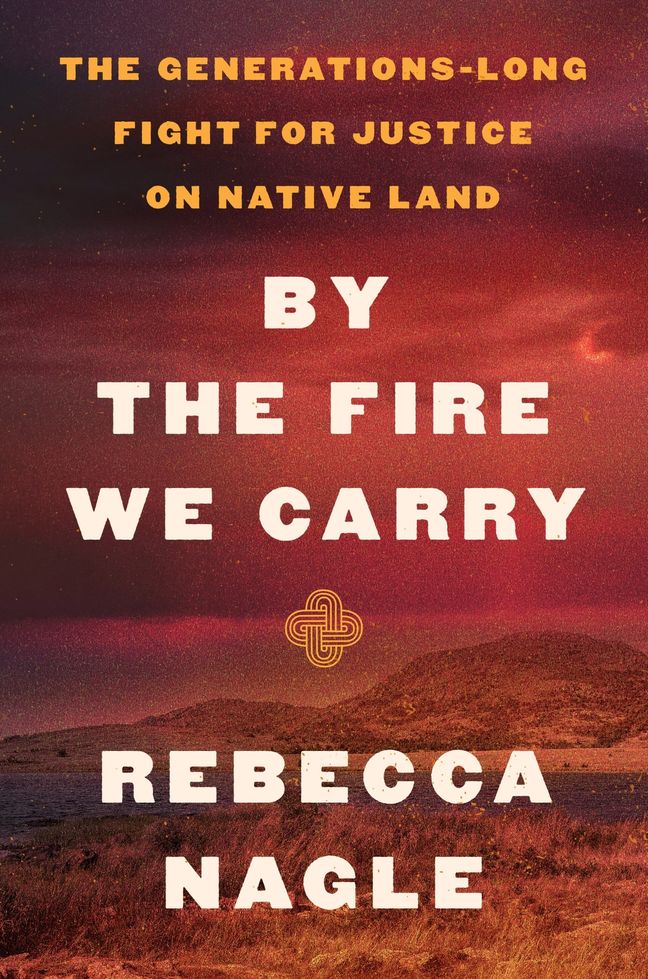
- Details
- By Jenna Kunze
In 1999, Patrick Murphy killed George Jacobs in rural Oklahoma. Four years after Murphy was sentenced to death, his public defender unraveled a mystery: Had the murder occurred on the Muscogee reservation, guaranteed by treaty but which, according to the State of Oklahoma, no longer existed? Did Oklahoma have jurisdiction over the case? Over 20 years later, in 2020, the Supreme Court ruled: most of eastern Oklahoma is tribal land.
In her forthcoming book “BY THE FIRE WE CARRY: The Generations-Long Fight for Justice on Native Land” (Harper; September 10, 2024), Cherokee journalist and reporter Rebecca Nagle tells the story of the long fight for tribal sovereignty in Eastern Oklahoma.
Native News Online spoke with Nagle about her book, the many ways the McGirt decision has shaped her life and career, and why this Supreme Court decision is important history for all Indigenous people, no matter their tribe.
EDITOR'S NOTE: This interviewQ&A has been edited for brevity and clarity.
NNO: At the center of your book about the Supreme Court’s landmark McGirt decision is a question about tribal sovereignty. Can you make that connection clear for readers?
Nagle: I think it's really a story of what happens in U.S. democracy when tribes have a legal right that non-Native residents don’t want a tribe to have. When those rights run up against non-Native interests, we often see them under attack. That happens to tribes all the time, whether it's hunting and fishing rights, gaming rights, tobacco sales.
In this case, it was the reservation of Muscogee Nation, which was never disestablished. But Oklahoma, since its creation in 1907, had acted like that reservation no longer existed. That question went all the way to the Supreme Court. And the Supreme Court really followed the law. I think it's a story of what our democracy is capable of doing when it comes to Indigenous rights, even though it can be inconsistent.
NNO: You say in your acknowledgements that this book came from a piece of writing, which led to the podcast, which then became a piece of writing again. Can you talk about your journey with this story?
Nagle: I first learned about the case in the summer of 2017 from a Muscogee legal scholar named Sarah Deer. When the case was at the Tenth Circuit, she posted about it on Facebook, and I saw her Facebook post, and I started following it then. As I learned through my reporting, the case had actually already been around for about 15 years at that point.
I wrote a couple articles about it, and one of those articles got picked up by Crooked Media. They made a podcast about it, and then I had the fortune of writing a book.
NNO: How many years did you spend reporting this book?
Nagle: I started working on the book in a concerted way at the beginning of 2021, but I had been following the case and doing some research since 2017.
NNO: What are some key distinctions between your book and the podcast?
Nagle: There’s a lot more research that went into the book, and there’s a lot more space within a book to share that research. I think the background of the case, the story of the case and its origins, and also the history, the book goes a lot more into that.
We spent very little time covering the original crime and the original trial, the murder of George Jacobs and Patrick Murphy being sentenced to death in the early, early stages of the case. I hadn't had a full sense of how much the original crime was a community tragedy. They were both from a really small, close knit community, and there are so many lives beyond the man who lost his life that were really, really impacted by the murder.
NNO: This book, like your podcast, includes both in-depth reporting on the murder and its proceedings, as well as personal anecdotes from your own family in order to tell the story of The Trail of Tears. When did it become clear that in order to write this book, you must include both?
Nagle: I think that there are limits to my perspective. I’m Cherokee, I’m not Muscogee. I pass as white, so I have a lot of privilege as an Indigenous person. In writing the book, I tried to strike a balance where I am both honest and upfront about my personal relationship to this case and how I see it from where I sit, and at the same time I really try to bring in other perspectives, including historical figures like the Naharkey family or Opothle Yoholo, or contemporary first language speakers. Even the people who are really directly impacted by the case.
NNO: Was there anything that particularly surprised you in your research?
Nagle: I spent a lot of time with primary source documents around the Ridges and their decision to sign Cherokee Nation’s removal treaty, the Treaty of New Echota. The main thing that I learned, that I knew, but I felt in a different way, was just how desperate they were for a solution to the crisis facing Cherokee Nation.
I don't necessarily think that they made the right decision, but I think that they made it for the right reason. It was the desire to try and preserve what could be preserved of the tribe at a time when the tribe was facing a really impossible situation. One of the themes of the book is Indigenous leaders grappling with the hard decisions that colonization can force our tribes and our leaders to make, and that those decisions aren't always clean or perfect or pure, but the totality of those decisions is what we have inherited as tribal citizens and as their descendants.
NNO: You write in the prologue that you wrote this book because you wanted the story of the historic Supreme Court decision to be well documented, and because it lived in your body and you wanted it to come out. Can you say more on that?
Nagle: I hope that the book is a service to tribal citizens and our community who know that this case was really important, and might know some underlying details, but don’t know the full 20+ year history of how this case came about.
I felt it was also important to document how the history is connected, and how a lot of these things repeat. For example, when it came to allotment, one of the big reasons that people said that allotment had to be necessary was because the lands of the Five Tribes were lawless and chaotic. You saw that exact same argument around the idea of affirming the reservations in 2020, and right after the reservations were affirmed. So those lies that are told about Indigenous Nations, and how they're repeated, was something I really wanted to document.
The last reason I give is that the story lives in my body, and selfishly, I wanted it to come out. Sometimes you also write things because you have to.
NNO: What inspired your title?
Nagle: I had been reading a lot of Joy Harjo’s poetry. That poem ‘Returning from the Enemy’ is a poem about going back to Muscogee homelands, and was one I had read over and over again. I just really liked that line:
‘I have returned to the homelands beloved by my people
Who were marched to the west
by the authority of a piece of paper.
I keep warm by the fire carried through cruelty.’
That metaphor is there throughout the book, this idea of generations of tribal citizens taking care of— literally— the fire, but also if you think about the fire symbolically as the fight for tribal sovereignty and Indigenous rights.
NNO: What is the future for this book? Where and when can readers buy it?
Nagle: The book is out on September 10, and there will be a book tour. We’ll be in Oklahoma, and have some stops on the east coast, as well as Albuquerque, Minneapolis, and Seattle.
People can pre-order it anywhere they get their books, from the big bookstores like Amazon and Barnes & Noble’s, but also you can order from your favorite local bookstore or online at a place called bookshop.
NNO: What would you say to Native folks outside of Oklahoma about how this history might relate to them?
Nagle: I think that Indigenous experiences are universal. Obviously things like history and treaty rights are really tribally-specific. But I think we have a lot of similarities in the way that colonization has impacted us. This book takes a broader view on the role of both Indigenous resistance and colonization in US democracy, and what it means.
More Stories Like This
Watermark Art Center to Host “Minwaajimowinan — Good Stories” ExhibitionMuseums Alaska Awards More Than $200,000 to 12 Cultural Organizations Statewide
Zuni Youth Enrichment Project Takes Top Emerging Artist Apprentices to Phoenix for Artistic Exploration and Cultural Immersion
From Dishwasher to Award-Winning Chef: Laguna Pueblo's Josh Aragon Serves Up Albuquerque's Best Green Chile Stew
Rob Reiner's Final Work as Producer Appears to Address MMIP Crisis
Help us defend tribal sovereignty.
At Native News Online, our mission is rooted in telling the stories that strengthen sovereignty and uplift Indigenous voices — not just at year’s end, but every single day.
Because of your generosity last year, we were able to keep our reporters on the ground in tribal communities, at national gatherings and in the halls of Congress — covering the issues that matter most to Indian Country: sovereignty, culture, education, health and economic opportunity.
That support sustained us through a tough year in 2025. Now, as we look to the year ahead, we need your help right now to ensure warrior journalism remains strong — reporting that defends tribal sovereignty, amplifies Native truth, and holds power accountable.
 The stakes couldn't be higher. Your support keeps Native voices heard, Native stories told and Native sovereignty defended.
The stakes couldn't be higher. Your support keeps Native voices heard, Native stories told and Native sovereignty defended.
Stand with Warrior Journalism today.
Levi Rickert (Potawatomi), Editor & Publisher


